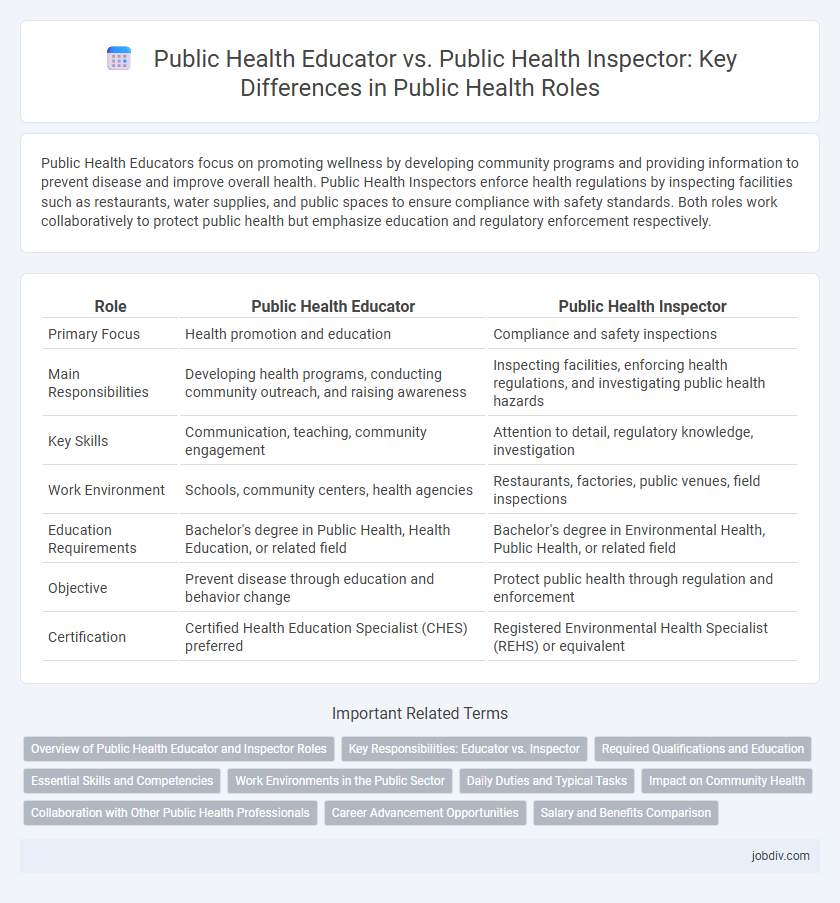Public Health Educators focus on promoting wellness by developing community programs and providing information to prevent disease and improve overall health. Public Health Inspectors enforce health regulations by inspecting facilities such as restaurants, water supplies, and public spaces to ensure compliance with safety standards. Both roles work collaboratively to protect public health but emphasize education and regulatory enforcement respectively.
Table of Comparison
| Role | Public Health Educator | Public Health Inspector |
|---|---|---|
| Primary Focus | Health promotion and education | Compliance and safety inspections |
| Main Responsibilities | Developing health programs, conducting community outreach, and raising awareness | Inspecting facilities, enforcing health regulations, and investigating public health hazards |
| Key Skills | Communication, teaching, community engagement | Attention to detail, regulatory knowledge, investigation |
| Work Environment | Schools, community centers, health agencies | Restaurants, factories, public venues, field inspections |
| Education Requirements | Bachelor's degree in Public Health, Health Education, or related field | Bachelor's degree in Environmental Health, Public Health, or related field |
| Objective | Prevent disease through education and behavior change | Protect public health through regulation and enforcement |
| Certification | Certified Health Education Specialist (CHES) preferred | Registered Environmental Health Specialist (REHS) or equivalent |
Overview of Public Health Educator and Inspector Roles
Public Health Educators design and implement programs to promote wellness and prevent disease, targeting communities through educational materials and outreach initiatives. Public Health Inspectors focus on monitoring and enforcing health regulations by conducting inspections of food establishments, water quality, and sanitation facilities to ensure public safety. Both roles are essential in maintaining community health but differ in emphasis on education versus regulatory compliance.
Key Responsibilities: Educator vs. Inspector
Public Health Educators design and implement community outreach programs to promote healthy behaviors and prevent disease through education and awareness campaigns. Public Health Inspectors conduct field inspections of food establishments, water sources, and public facilities to ensure compliance with health regulations and identify potential hazards. While Educators focus on influencing behavior and knowledge, Inspectors emphasize enforcing legal standards and safeguarding public safety.
Required Qualifications and Education
Public Health Educators typically require a bachelor's degree in health education, public health, or a related field, with many positions favoring a master's degree and certifications such as Certified Health Education Specialist (CHES). Public Health Inspectors often need a diploma or degree in environmental health, public health, or a related science, along with certifications like Registered Environmental Health Specialist (REHS) or equivalent licensing depending on the jurisdiction. Both roles demand strong knowledge of public health principles, but Inspectors focus more on regulatory compliance and environmental assessments, while Educators emphasize community health promotion and behavior change strategies.
Essential Skills and Competencies
Public Health Educators excel in communication, community engagement, and behavior change strategies to promote health awareness and education. Public Health Inspectors demonstrate strong analytical skills, attention to detail, and knowledge of regulatory compliance to identify and mitigate health hazards. Both roles require critical thinking, problem-solving abilities, and a thorough understanding of public health principles to effectively protect and improve community health outcomes.
Work Environments in the Public Sector
Public Health Educators typically work in community health organizations, government agencies, and schools, focusing on promoting wellness and disease prevention through education programs. Public Health Inspectors operate primarily within regulatory bodies and local government departments, conducting inspections and enforcing health and safety standards in public facilities. Both professions play vital roles in public sector health initiatives but differ in their direct interaction with the public and regulatory responsibilities.
Daily Duties and Typical Tasks
Public Health Educators develop and implement programs to promote healthy behaviors, conduct community outreach, and create educational materials tailored to diverse populations. Public Health Inspectors focus on inspecting facilities, enforcing health regulations, and identifying potential hazards to ensure compliance with public health laws. While educators emphasize awareness and prevention strategies, inspectors concentrate on regulatory enforcement and public safety monitoring.
Impact on Community Health
Public Health Educators directly influence community health by designing and delivering programs that promote healthy behaviors and prevent disease, enhancing overall well-being through education and awareness. Public Health Inspectors ensure safe environments by enforcing health regulations and conducting inspections, reducing risks of outbreaks and environmental hazards. Both roles are essential for comprehensive public health strategies, with Educators focusing on proactive behavior change and Inspectors on regulatory compliance.
Collaboration with Other Public Health Professionals
Public Health Educators and Public Health Inspectors collaborate closely to enhance community health outcomes by combining education initiatives with regulatory enforcement. Public Health Educators develop targeted health promotion campaigns based on data and community needs identified by Public Health Inspectors during inspections. This interdisciplinary partnership ensures effective disease prevention, compliance with health codes, and improved public awareness of health risks.
Career Advancement Opportunities
Public Health Educators advance by gaining specialized certifications such as Certified Health Education Specialist (CHES) and moving into roles like program director or community health manager. Public Health Inspectors can progress by obtaining credentials like Registered Environmental Health Specialist (REHS) and advancing to supervisory or regulatory compliance positions. Both careers offer pathways to leadership in policy development, but educators often focus on community engagement while inspectors emphasize regulatory enforcement.
Salary and Benefits Comparison
Public Health Educators typically earn an average salary ranging from $45,000 to $70,000 annually, with benefits including health insurance, retirement plans, and paid leave, reflecting their role in community health promotion and education. Public Health Inspectors, who enforce health regulations, generally receive higher compensation, averaging between $50,000 and $80,000 per year, often supplemented with benefits such as hazard pay, extensive health coverage, and pension schemes due to the regulatory nature of their work. Salary and benefits for both roles vary by region, experience, and level of government employment, making them competitive but distinct within the public health sector.
Public Health Educator vs Public Health Inspector Infographic

 jobdiv.com
jobdiv.com